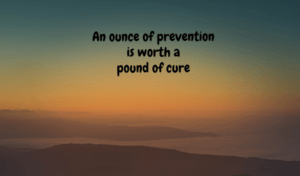A poor appetite may be the source of your health concerns
Good digestion starts with a good appetite. Feeling hungry indicates your stomach and pancreas are producing hydrochloric acid and digestive enzymes (sometimes referred to as gastric acid or juices). This means your body is ready to break down the food you consume and absorb the all-important protein, carbohydrates, fats, vitamins and minerals it needs to function optimally.
Sometimes, having an appetite or feeling hungry is viewed as a bad thing, particularly for clients who want to lose weight but this is just not true. It is important to understand that having an appetite is required for optimal nutritional status. It is the first step in the chain of optimal digestion.
Poor appetite = poor digestion = poor health
(and nobody wants poor health)
A lack of appetite is not unusual when you are unwell. If you have ever been sick, you probably know that you just lose interest in food. This is normal. It’s your body’s way of saying “don’t give me another job to do, I’m busy”. As you recover (either naturally or with help), your appetite should return. But what if an illness isn’t the reason for your lack of appetite?
Why does having an appetite matter?
Having an appetite means your body is more likely to effectively break down the food you eat and use it as fuel.
A robust appetite means you feel the physical signs of hunger, like a rumbling tummy, feeling faint, or a strong urge to eat anything. This indicates your gastric juices are being stimulated before you even put food in your mouth. So, your digestive system is primed for when food is consumed. The nutrients from the food are cleaved away, absorbed and used by the body.
The stimulation of these gastric juices also sends signals to other organs lower down the digestive tract, getting them ready for action too.
Signs you may not have enough hydrochloric acid and digestive enzymes
- Not feeling hungry very often (but maybe you eat anyway because you think you should)
- You experience bloating or have indigestion or reflux within an hour of eating (yes, reflux can be a sign of low hydrochloric acid as well as high)
- You get stomach cramps within an hour of eating
- A feeling that you never feel satisfied. This may be a result of not absorbing the nutrients you need from your food, hence your body craves more fuel.
- There is undigested food in your stool
- You have allergies, skin issues or other gut-related problems
- Your energy levels are low
- Your iron levels are low despite adequate supplementation
Of course, these may also be signs of other conditions and therefore it is important to speak to your naturopath to work out what’s causing your symptoms.
What does a ‘healthy appetite’ look like?
You may be wondering what I consider to be a ‘healthy appetite’. Here are some of the signs that I like to see when discussing the digestive system with my clients:
- A feeling of hunger within 1 to 2 hours of waking up in the morning
- You experience physical hunger pangs such as a rumbling stomach approximately every 4-5 hours
- You don’t feel hungry all the time, after a meal you will feel full.
- When you feel hungry you are not fixated on one food but would be happy to eat a variety of foods
7 ways to improve your appetite
If you don’t have a good appetite there are ways to improve it. A consultation with your naturopath is helpful to understand your health in detail and make sure there are no other underlying causes for your health concerns.
In the meantime, you can adopt these 7 tips for improving your appetite.
- Remove processed, fast foods and other unhealthy foods from your shopping basket
A diet high in refined sugar, salt, unhealthy fats and heavily processed food does not provide your body with enough nutrients to produce hydrochloric acid and digestive enzymes. - Increase your intake of zinc-rich food
Zinc is an important nutrient required for the production of hydrochloric acid. You can get zinc from pumpkin seeds, wholegrains, lean red meat and poultry, chickpeas and lentils. - Make sure you are getting your B-group vitamins
Gastric juices also need B-group vitamins. B vitamins are found in a wide variety of foods such as wholegrains, fish, lean meat and poultry, legumes, nuts, seeds and green leafy vegetables. - Drink lemon water or apple cider vinegar in water before meals
Squeeze half a lemon into water or add a tablespoon of apple cider vinegar into a glass of water and drink 15 – 30 minutes before food. Both of these help to stimulate the secretion of your gastric juices. - Include bitter foods in your meals
Bitter foods such as rocket, spinach, kale, radish, dill and fennel all work by stimulating your gastric juices. Add them to your meals every day. - Manage your stress levels
An increase in cortisol production (one of your stress hormones) can reduce the production of hydrochloric acid. Therefore, in times of acute and chronic stress, your appetite can be negatively affected. So, make relaxation part of your everyday routine, think of it like exercise, an essential part of a healthy lifestyle. - Practice ‘mindful’ eating
Mindful eating really is just taking the time to stop and appreciate your food. By taking the time to prepare your food, look at it and smell it, you are more likely to start feeling hungry. Eating away from screens or other distractions and slowing down while you eat are also ways to support your digestive processes.
If you are doing these things and still not feeling hungry, book a free Clarity Call with me to discuss your issues (scheduler at the end of this post). Alternatively, you can read more about how naturopathy can help.
What if you are trying to lose weight?
Many people wanting to lose weight might think that having no appetite would be easier. But they would be wrong. You still need an appetite for the reasons stated above. You will likely be eating fewer kilojoules so you want to make sure you are getting every drop of nutrition out of your food.
When it comes to weight loss, it is more important to understand why you’re feeling hungry. Are you hungry because your body is giving you the physical signs of hunger such as a rumbling stomach, feeling low in energy and a drive to eat anything? Or are you hungry because you are feeling emotional. Or maybe you have a specific craving? For example; you really only want to eat chocolate not vegetables. There are many reasons why we eat, so tuning in and listening to your body’s signals, and asking yourself why you are wanting to eat, is a good place to start.





